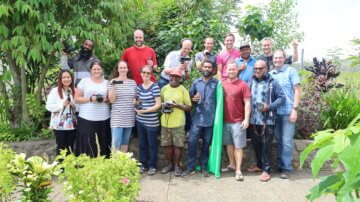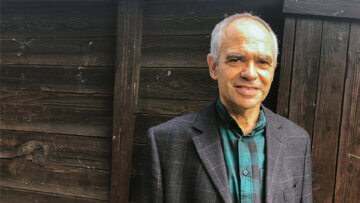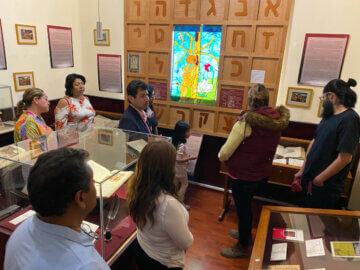How CABTAL Completed 9 New Testaments in Violence-Torn Regions
Bible translation work nearly came to a halt in some parts of Cameroon, owing to a socio-political crisis that has killed about 6,000 people since 2017. But, even while fleeing for their lives, translators continued to draft Scriptures in their languages. Isaac Genna Forchie, a native of the Bamenda region of northwest Cameroon, travelled to some of the impacted areas to gather first-hand stories from translation teams.

Jesse Ganglah
“We were recording the Easter story in the Lus language when we heard that soldiers were coming,” recalls Jesse Ganglah, Cluster Facilitator serving with the Cameroon Association for Bible Translation and Literacy (CABTAL). “At that moment, everybody was fleeing from the village because irate soldiers could not have time to distinguish separatists from civilians.”
“Everyone stood a risk of being gunned down. I saw people with their mattresses, mats, stuff and children fleeing into the bushes and across to Nigeria. They forgot their computer but one translator braved the odds to go back for it.”
This is one of many stories of how Bible translators in Cameroon’s English-speaking northwest and southwest have coped with a fierce socio-political crisis that almost halted translation work. In spite of all the odds, they have completed nine New Testaments in the last two years.
About the Violence
The ongoing civil unrest started when Anglophone lawyers and teachers dropped their tools in October 2016, protesting what they said was “a deliberate attempt” by the central government to wipe out two of their core cultural values — the Common Law and the Anglo-Saxon Sub-System of Education.
The government countered with a fierce clampdown on dissent. This resulted in an escalation of tensions and further clashes as a separatist movement emerged. The situation deteriorated into an armed conflict that still lingers, leading to the deaths of some 6,000 people and displacing over 765,000 others. 70,000 of them were refugees in neighbouring Nigeria, among whom are translators who fled with their computers. Some faced yet another threat from Boko Haram.
One of the projects that came face-to-face with the crisis was Ngwo, a language spoken in northwest Cameroon.
“Because we didn’t finish our task one day in 2017, we decided to take our computers home,” remembers Siphra Nde. That turned out to be the reason their computers were spared. “As we left, the whole market square, including the project office, was put on fire.”
“That was the last day we used the office,” she says.
While others fled into the wild for safety, it was even harder for 54-year-old Nde who lived with children and her ageing parents.
The next day, they trekked through the bush to a location close to the regional capital, Bamenda. “We cried out to CABTAL and they sent a car that transported us to safety in Bamenda,” Nde says.
“We trekked for over 10 hours. We arrived in Bamenda with all the shock to face yet another challenge – no place to sleep.”
Her cousin hosted her for two weeks before she eventually rented a small room where she, the kids and her aging parents lived for several years.

Siphra Nde
Work Amid Gunfire
At gunpoint, others like Protus Effange had to prove that they were only Bible translators and not spies. “Are you sure that you are doing God’s work?” the gunmen asked the Bakwere translator.
“Our office neighbourhood around Muea became a battlefield for separatists and soldiers,” Effange says. Literacy and Scripture engagement activities came to a near end.
“I can remember a time we had a certain workshop,” Effange says. “We had gathered and prayed and we were about to start and we heard thunderous gunshots that dispersed us.”

Protus Effange
Deprived of God’s Word
Given that Bible translation is a complex and challenging task that requires dedication, expertise and collaboration, crises like these around the world pose a severe threat. Violence, displacement, insecurity, lack of resources and communication can delay, suspend or cancel projects. This has deprived millions of people from accessing the Word of God in their own language. In 2020, some 30 translation projects were suspended in neighbouring Nigeria because of terrorism. Elsewhere, the Ukraine-Russia war continues to pose a stark danger to Bible translation in former Soviet nations.
New Challenges Spark Innovation
Similar challenges caused the same effect in Cameroon, but this pushed CABTAL to think beyond the ordinary.
“Before the crisis, translators were able to travel freely in the communities to draft Scriptures without any fear, literacy workers went about easily, and consultants were able to travel into communities. But everything suddenly changed,” says Emmanuel Keyeh, CABTAL’s General Director.
“It has become hard for people to even come together on one spot.”
This brought about uncertainty. But the worst didn’t happen as CABTAL assisted translators who fled with their computers and drafts to safer areas and to neighbouring Nigeria.
“We moved some to areas where they could have access to translation consultants,” Keyeh says.
Access to basic needs became a challenge.
“CABTAL gave us some bags of rice and some extra money for our upkeep,” says Siphra Nde. She was then able to continue drafting the New Testament in Ngwo.
Literacy activities moved from the traditional and took a new form. “We encouraged communities to get involved in urban and digital literacy,” Keyeh says. When schools were shut down, literacy teachers in Ngwo followed the learners to churches and their hideouts, where teaching and learning continued.

Dr Emmanuel Keyeh Lufang
Fruits that Bring Hope
Like the Ngwo and Bakwere teams, the Mankon, Ngie, Moghamo, Essimbi, Mmen, Esu and Weh languages had their own unique experiences. But their great hope is in the recently completed New Testament in these languages, which has been typeset and sent for printing. The communities are now raising funds and mobilising for dedication.
Before his death last year, their venerated traditional Mankon leader, Fon Angwafo III greeted the translators’ copy with joy.
“He presented it to the pastors and allocated a piece of land for us to construct a literacy centre where we could also translate the Old Testament,” says Magerate Ndenge, a Mankon translator.
The Bakwere team looks forward to great impact. One of the translators remembers how they visited an elderly custodian of their language.
“He was also sick but we wanted him to listen and confirm the naturalness of a portion of Scripture we had translated,” Protus Effange says. The custodian invited all of his children and grandchildren to the session.
“As I read, I saw tears dripping from his eyes. I stopped and asked him if the pains were getting worse. And he responded saying, ‘You are reading into my heart’.”
The man who could not stand upright suddenly stood and walked to see the translators off as they returned.
Effange looks forward to the impact the entire New Testament stands to create in his community. An initial dedication date was set but later deferred because their New Testament did not arrive as initially expected.
“It looks strange to us that even with the socio-political situation, productivity has rather increased,” says Keyeh, CABTAL’s General Director. He adds that innovation has given the opportunity to people in the diaspora to learn how to read and write in their languages, either virtually or in person.
“The challenges have come, but with the adjustments, we are seeing quite some formidable results from what God is doing in these communities.”

The Mfumte team continued translating their New Testament in this building donated by a church in neighbouring Magba.
•••
Story and photos: Isaac Genna Forchie, CABTAL
Alliance organisations may download and use the images from this article
The latest
View all articles
Informing, teaching, inspiring: PNG workshop teaches video storytelling for language communities
PNG workshop teaches video storytelling for language communities
Read more
Looking ahead at 2024
As the year unfolds, we marvel at the work of God in our rapidly changing world. And, we look forward to a number of gatherings and conversations intended to draw us together.
Read more
Telling the Bible's Story
It may come as a surprise that a museum is among the Wycliffe Global Alliance organisations.
Read more